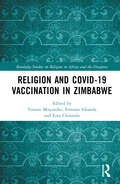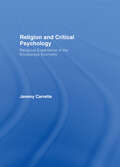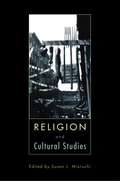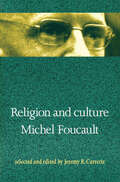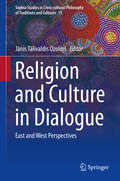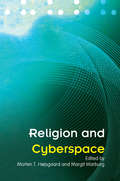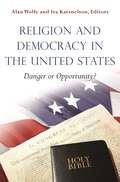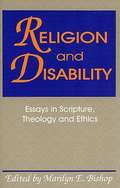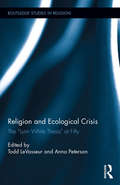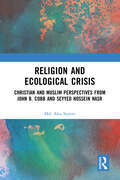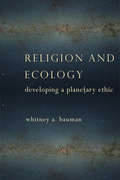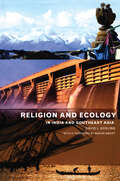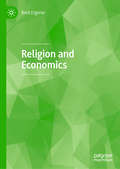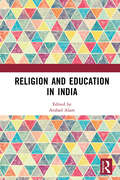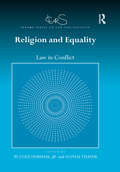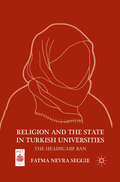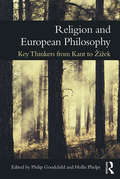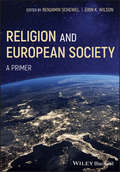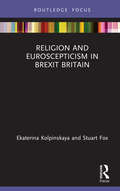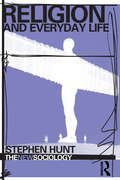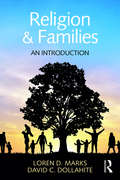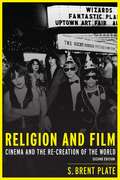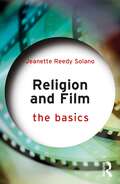- Table View
- List View
Religion and COVID-19 Vaccination in Zimbabwe (Routledge Studies on Religion in Africa and the Diaspora)
by Tenson MuyamboThis book analyses the role of religion during the COVID- 19 pandemic and vaccination rollout in Zimbabwe. Zimbabwe was listed by the World Health Organization (WHO) as one of thirteen African countries to have fully vaccinated more than 10% of its population against COVID- 19 by the end of September 2021, but the country fell far short of the government’s own target for achieving 60% inoculation by December 2020. This book analyses whether religion played a role in explaining why the government’s pro- vaccine stance did not translate into high vaccination rates. Drawing upon various religions, including African indigenous religions, Christianity and Islam, the book considers how faith actors demonstrated vaccine acceptance, resistance or hesitancy. Zimbabwe offers a particularly interesting and varied case for analysis, and the original research on display here will be an important contribution to wider debates on religion and COVID- 19. This book will be useful to academics, researchers and students studying religious studies, sociology, health and well- being, religion and development.
Religion and Critical Psychology: Religious Experience in the Knowledge Economy
by Jeremy CarretteJeremy Carrette argues that the psychology of religion is no longer sustainable without a social critique, and that as William James predicted, the project of the modernist psychology of religion has failed. Controversially he champions greater social and philosophical analysis within the field to challenge the political naivety and disciplinary illusions of the traditional approaches to psychology of religion. Carrette discusses the relevance of the social and economic factors surrounding the debates of psychology and religion, through three critical examples: psychoanalysis humanistic psychology cognitive neuroscience. A Critical Psychology of Religion provides a new dimension to the debates surrounding religious experience. It will be of interest to students and researchers in the fields of critical psychology, religious experience and the psychology of religion and extends an interdisciplinary challenge to the separation of psychology, sociology, politics, economics and religion.
Religion and Cultural Studies
by Susan L. MizruchiAmericans have never been more religious than they are now, at the dawn of the twenty-first century. By all reports, attendance rates at traditional places of worship are high and rising; the influx of new immigrant religions has revitalized standard faiths and drawn in those who had strayed from them. Popular television shows like "The Simpsons" feature characters who go to church every Sunday and speak to God; special events, like the 1998 outdoor mass in Worcester, Massachusetts, for a comatose girl believed to have miraculous powers, attract thousands of people. This collection is both part of this ferment and an intellectual reflection upon it. Religion and Cultural Studies features essays by major scholars from the fields of anthropology, history, literary criticism, and religion in order to enrich critical discourse about religion and culture. Despite the variety of disciplines represented by this group of scholars and the variety of cultures explored in their essays--from fifteenth-century Flemish asceticism and nineteenth-century African-American spiritualism to Russian blood-libel trials and Alien Abduction Reports in the twentieth century--their common ground is the question of religion's place in current American academic analysis, and more broadly in American life today. The volume's range of vocabulary and subject matter is aimed at vitalizing scholarly interest in the field of religion and cultural studies and deepening intellectual inquiry in the contemporary academy. The contributors are Eytan Bercovitch, Karen McCarthy Brown, Gillian Feeley-Harnik, Richard Wightman Fox, Jenny Franchot, Giles Gunn, Geoffrey Galt Harpham, Bruce B. Lawrence, Jack Miles, Susan L. Mizruchi, and Jonathan Z. Smith.
Religion and Culture
by Michel FoucaultFirst Published in 1999. Routledge is an imprint of Taylor & Francis, an informa company.
Religion and Culture in Dialogue
by Jānis Tālivaldis OzoliņšThis volume addresses the issue of the human encounter with the Mystery of God and the purpose of human life. It explores major themes from diverse cultural and philosophical traditions, starting with questions about the possibility of belief in God, His transcendence as seen in both East and West, and ending with questions about ethics and about personhood, human dignity and human rights. Taking an eclectic approach, the chapters in this book each uniquely address aspects of the human encounter with the Mystery of God, drawing from specific cultures and traditions, and using a particular philosophical and theological style. Together, the chapters provide a fresh approach and a synergy that ensures that each topic contributes something new to the dialogue between religion and culture.
Religion and Cyberspace
by Margit Warburg Morten T. HøjsgaardIn the twenty-first century, religious life is increasingly moving from churches, mosques and temples onto the Internet. Today, anyone can go online and seek a new form of religious expression without ever encountering a physical place of worship, or an ordained teacher or priest. The digital age offers virtual worship, cyber-prayers and talk-boards for all of the major world faiths, as well as for pagan organisations and new religious movements. It also abounds with misinformation, religious bigotry and information terrorism. Scholars of religion need to understand the emerging forum that the web offers to religion, and the kinds of religious and social interaction that it enables.Religion and Cyberspace explores how religious individuals and groups are responding to the opportunities and challenges that cyberspace brings. It asks how religious experience is generated and enacted online, and how faith is shaped by factors such as limitless choice, lack of religious authority, and the conflict between recognised and non-recognised forms of worship. Combining case studies with the latest theory, its twelve chapters examine topics including the history of online worship, virtuality versus reality in cyberspace, religious conflict in digital contexts, and the construction of religious identity online. Focusing on key themes in this groundbreaking area, it is an ideal introduction to the fascinating questions that religion on the Internet presents.
Religion and Democracy in the United States: Danger or Opportunity?
by Alan Wolfe and Ira Katznelson EditorsThe United States remains a deeply religious country and religion plays an inextricably critical role in American politics. Controversy over issues such as abortion is fueled by opposition in the Catholic Church and among conservative Protestants, candidates for the presidency are questioned about their religious beliefs, and the separation of church and state remains hotly contested. While the examination of religion's influence in politics has long been neglected, in the last decade the subject has finally garnered the attention it deserves. In Religion and Democracy in the United States, prominent scholars consider the ways Americans understand the relationship between their religious beliefs and the political arena. This collection, a work of the Task Force on Religion and American Democracy of the American Political Science Association, thoughtfully explores the effects of religion on democracy and contemporary partisan politics. Topics include how religious diversity affects American democracy, how religion is implicated in America's partisan battles, and how religion affects ideas about race, ethnicity, and gender. Surveying what we currently know about religion and American politics, the essays introduce and delve into the range of current issues for both specialists and nonspecialists. In addition to the editors, the contributors are Allison Calhoun-Brown, Rosa DeLauro, Bette Novit Evans, James Gibson, John Green, Frederick Harris, Amaney Jamal, Geoffrey Layman, David Leal, David Leege, Nancy Rosenblum, Kenneth Wald, and Clyde Wilcox.
Religion and Disability: Perspectives in Scripture, Theology, and Ethics
by Marilyn E. BishopA collection of essays on disability and religion.
Religion and Ecological Crisis: The “Lynn White Thesis” at Fifty (Routledge Studies in Religion)
by Todd LeVasseur Anna PetersonIn 1967, Lynn White, Jr.’s seminal article The Historical Roots of Our Ecologic Crisis was published, essentially establishing the academic study of religion and nature. White argues that religions—particularly Western Christianity—are a major cause of worldwide ecological crises. He then asserts that if we are to halt, let alone revert, anthropogenic damages to the environment, we need to radically transform religious cosmologies. White’s hugely influential thesis has been cited thousands of times in a variety of disciplines, including but not limited to religious studies, environmental ethics, history, ecological science, philosophy, psychology, and anthropology. In practical terms, the ecological crisis to which White was responding has only worsened in the decades since the article was published. This collection of original essays by leading scholars in a variety of interdisciplinary settings, including religion and nature, environmental ethics, animal studies, ecofeminism, restoration ecology, and ecotheology, considers the impact of White’s arguments, offering constructive criticism as well as reflections on the ongoing, ever-changing scholarly debate about the way religion and culture contribute to both environmental crises and to their possible solutions. Religion and Ecological Crisis addresses a wide range of topics related to White’s thesis, including its significance for environmental ethics and philosophy, the response from conservative Christians and evangelicals, its importance for Asian religious traditions, ecofeminist interpretations of the article, and which perspectives might have, ultimately, been left out of his analysis. This book is a timely reflection on the legacy and continuing challenge of White’s influential article.
Religion and Ecological Crisis: Christian and Muslim Perspectives from John B. Cobb and Seyyed Hossein Nasr
by Md. Abu SayemReligion and Ecological Crisis delves into the complex relationship between religions and ecology, presenting Christian and Islamic perspectives on ecological issues through the work of John Boswell Cobb and Seyyed Hossein Nasr. It examines how faith traditions of the world see and respond to our current unprecedented climate change issues. This is the first comparative study of Cobb and Nasr’s eco-religious understanding, and explores how their prescriptions can contribute alternatively to techno-scientific initiatives in environmental sustainability. Taking Cobb’s "economism" and Nasr’s "scientism" as the key concepts for surveying the roots of the ecological crisis, the book offers interdisciplinary and interreligious insights into the debates about ecological equilibrium, motivational awareness in human mind and about entanglements between religion and the environment. This will be an insightful resource for policy makers, faith leaders and for academics working in Environmental Studies and Religious Studies.
Religion and Ecology: Developing a Planetary Ethic
by Whitney BaumanMoving beyond identity politics while continuing to respect diverse entities and concerns, Whitney A. Bauman builds a planetary politics that better responds to the realities of a pluralistic world. Calling attention to the historical, political, and ecological influences shaping our understanding of nature, religion, humanity, and identity, Bauman collapses the boundaries separating male from female, biology from machine, human from more than human, and religion from science, encouraging readers to embrace hybridity and the inherent fluctuations of an open, evolving global community.As he outlines his planetary ethic, Bauman concurrently develops an environmental ethic of movement that relies not on place but on the daily connections we make across the planet. He shows how both identity politics and environmental ethics fail to realize planetary politics and action, limited as they are by foundational modes of thought that create entire worlds out of their own logic. Introducing a postfoundational vision not rooted in the formal principles of "nature" or "God" and not based in the idea of human exceptionalism, Bauman draws on cutting-edge insights from queer, poststructural, and deconstructive theory and makes a major contribution to the study of religion, science, politics, and ecology.
Religion and Ecology in India and Southeast Asia
by David L GoslingWhat part can Hindu and Buddhist traditions play in resolving the ecological problems facing India and South East Asia? David Gosling's exciting study, based on extensive fieldwork, is of global significance: the creation of more sustainable relationships between people and the natural world is one of the most urgent social and environmental problems of the new millennium. David Gosling looks at the religions historically and from a contemporary perspective.
Religion and Economics
by Resit ErgenerThis book allows the reader to have an overview of the relations between religion and economics throughout history. It starts with the beginnings of early modern humans, when dreams (of dead ancestors), animism, synchronous movements and a propensity to exchange, led to the emergence of religion, which then contributed to the coordination and pooling of labor and to the definition of groups. This book surveys the various roles played by religion in economic life through the ages, which include the justification of the exploitation of nature, the expansion of trade, the emergence of inequality and of charity, the definition, enhancement and attenuation of hierarchies of dominance, the provision of various services and of the impact religion has had on economic performance at the micro and macro levels.
Religion and Education in India
by Arshad AlamThis book studies the relationship between religion and education in the Indian context. It analyses the creative interface between religion and education as empirical categories and overlapping modes of pedagogical transmission. The volume investigates the ways in which religious identities are shaped through education both at home and at school. It brings together academics and researchers working in different faith traditions like Islam, Hinduism, and Sikhism to understand the significance of transmitting religious education and the need to pay closer attention to sites through which religious instruction is being disseminated. Topical and lucid, this book will be an important reading for scholars and researchers of sociology, religious studies, secularism, sociology of education, political sociology, South Asia studies, and education in general.
Religion and Equality: Law in Conflict (ICLARS Series on Law and Religion)
by W. Cole Durham Jr. Donlu D ThayerThis volume presents an analysis of controversial events and issues shaping a rapidly changing international legal, political, and social landscape. Leading scholars and experts in law, religious studies and international relations, thoughtfully consider issues and tensions arising in contemporary debates over religion and equality in many parts of the world. The book is in two parts. The first section focuses on the anti-discrimination dimension of religious freedom norms, examining the developing law on equality and human rights and how it operates at international and national levels. The second section provides a series of case studies exploring the contemporary issue of same-sex marriage and how it affects religious groups and believers. This collection will be of interest to academics and scholars of law, religious studies, political science, and sociology, as well as policymakers and legal practitioners.
Religion and Ethics in a Globalizing World: Conflict, Dialogue, and Transformation (Middle East Today)
by Luca Anceschi Joseph Anthony Camilleri Ruwan Palapathwala Andrew WickingThis book explores educational and cultural experiences of 'part-time' unveilers during their undergraduate degree programs in public institutions in Turkey. The term 'part-time unveiler' refers to undergraduate female students who cover their hair in their private lives but who remove the headscarf while at a Turkish university.
Religion and Ethnicity in Canada
by Paul Bramadat David SeljakAs the leading book in its field, Religion and Ethnicity in Canada has been embraced by scholars, teachers, students, and policy makers as a breakthrough study of Canadian religio-ethnic diversity and its impact on multiculturalism. A team of established scholars looks at the relationships between religious and ethnic identity in Canada's six largest minority religious communities: Hindus, Buddhists, Sikhs, Jews, Muslims and practitioners of Chinese religion. The chapters also highlight the ethnic diversity extant within these traditions in order to offer a more nuanced appreciation of the variety of lived experiences of members of these communities.Together, the contributors develop consistent themes throughout the volume, among them the changing nature of religious practice and ideas, current demographics, racism, and the role of women. Chapters related to the public policy issues of healthcare, education and multiculturalism show how new ethnic and religious diversity are challenging and changing Canadian institutions and society. Comprehensive and insightful, Religion and Ethnicity in Canada makes a unique contribution to the study of world religions in Canada.
Religion and European Philosophy: Key Thinkers from Kant to Žižek
by Philip Goodchild Hollis PhelpsReligion and European Philosophy: Key Thinkers from Kant to Žižek draws together a diverse group of scholars in theology, religious studies, and philosophy to discuss the role that religion plays among key figures in the European philosophical tradition. Designed for accessibility, each of the thirty-four chapters includes background information on the key thinker, an overview of the main themes, concepts, and concerns that occupy his or her attention, and a discussion of the religious and theological elements present in his or her thought, in light of contemporary issues. Given the scope of the volume, Religion and European Philosophy will be the go-to guide for understanding the religious and theological dimensions of European philosophy, for both students and established researchers alike.
Religion and European Philosophy: Key Thinkers from Kant to Žižek
by Philip Goodchild Hollis PhelpsReligion and European Philosophy: Key Thinkers from Kant to Žižek draws together a diverse group of scholars in theology, religious studies, and philosophy to discuss the role that religion plays among key figures in the European philosophical tradition. Designed for accessibility, each of the thirty-four chapters includes background information on the key thinker, an overview of the main themes, concepts, and concerns that occupy his or her attention, and a discussion of the religious and theological elements present in his or her thought, in light of contemporary issues. Given the scope of the volume, Religion and European Philosophy will be the go-to guide for understanding the religious and theological dimensions of European philosophy, for both students and established researchers alike.
Religion and European Society: A Primer
by Benjamin Schewel Erin K. WilsonA contemporary examination of the role of religion in the European public sphere and beyond Although the role of religion has arguably declined in the societies of Western and Northern Europe, religious participation in other parts of the continent and among growing immigrant communities remains an important aspect of daily life. Recent years have seen a resurgence of religion in the public sphere, prompting many researchers to view European secularism as an outlier in this global trend. Religion and European Society: A Primer presents recent academic literature that explores key developments and current debates in the field, covering topics such as changing patterns of belief, religion across the political spectrum, and development and humanitarian aid. Articles written by leading scholars draw from well-established findings to help readers contemplate the role of religion in public life, understand the assumptions and underpinnings of the secular worldview, and develop new ways of thinking about global issues relevant to contemporary global affairs. Each theme is addressed by several articles to provide readers with diverse, sometimes competing perspectives. This volume offers concepts and ideas that can be used in various policy, practitioner, and academic settings—clarifying overarching concepts and trends rather than analyzing specific policy issues that can quickly become outdated. Addresses issues of contemporary importance such as demographic changes in religious observance, increased immigration, the emergence of new religious movements, and changes in more established religions Explores the ethical and philosophical concepts as well as the practical, everyday consequences of European post-secularism Challenges widespread assumptions about the secular nature of the modern public sphere Offers analytical tools as well as practical policy recommendations on a range of issues including media, regulation, gender, conflict and peacebuilding, immigration and humanitarianism. Designed to move research findings from academic journals to the realm of public discourse, Religion and European Society: A Primer is a valuable source of information for practitioners within and outside of Europe of religious studies, politics, and international affairs.
Religion and Euroscepticism in Brexit Britain (Routledge Focus on Religion)
by Ekaterina Kolpinskaya Stuart FoxReligion has a significant effect on how Europeans feel about the European Union (EU) and has had an important impact on how people voted in the UK’s ‘Brexit referendum’. This book provides a clear and accessible quantitative study of how religion affects Euroscepticism and political behaviour. It examines how religion has affected support for EU membership since the UK joined the European Economic Community, through to the announcement of the Brexit referendum in 2013, to the referendum itself in 2016. It also explores how religion continues to affect attitudes towards the EU post-Brexit. The volume provides valuable insights into why the UK voted to leave the EU. Furthermore, it highlights how religion affects the way that citizens throughout Europe assess the benefits, costs and values associated with EU membership, and how this may influence public opinion regarding European integration in the future. This timely book will be of important interest to academics and students focusing on religion and public attitudes, contemporary European and British politics as well as think tanks, interest groups and those with an interest in understanding Brexit.
Religion and Everyday Life (The New Sociology)
by Stephen HuntThis introductory text explores the historical and contemporary relevance of religion to social life, through an examination of practice and belief. Author Hunt reconsiders how theories and concepts are lived at the level of selfhood and cultural identity, through religious and spiritual belief. At the same time he looks at contemporary changes in religious life and how these are impacted by socialization, institutional belonging, and belief, and at the significance of class, gender, age and ethnicity. Individual chapters cover a range of issues, such as: religion, identity and community secularization and pluralism traditional Christianity: change and continuity globalization and the global context religion and ethnicity. The text challenges much current sociological thought and deals with contemporary Christianity, a range of world faiths and new and developing expressions of religion and spirituality. With tables and diagrams to illustrate key points and trends, it provides an accessible and captivating introduction to the sociology of religion.
Religion and Families: An Introduction (Textbooks in Family Studies)
by Loren D. Marks David C. DollahiteThis is the first multidisciplinary text to address the growing scholarly connection between religion and family life. The latest literature from family studies, psychology, sociology, and religion is reviewed along with narratives drawn from interviews with 200 racially, religiously, and regionally diverse families which bring the concepts to life. Written in a thought-provoking, accessible, and sometimes humorous style by two of the leading researchers in the field, the book reflects the authors’ firsthand experience in teaching today’s students about religion’s impact on families. Prior to writing the book, the authors read the sacred texts of many faiths, interviewed religious leaders, and attended religious services for a wide array of faiths. The result is an accurate and engaging account of why and how families are impacted by their religion. The pedagogical features of the text include boldfaced key terms defined in the glossary, text boxes, chapter conclusions, summary points, and review questions. Religion and Families: Examines several denominations within Christianity, Judaism, and Islam. Reviews findings from racially and ethnically diverse families, from traditional and diverse family forms, and examines gender and life-course issues. Addresses the impact of one’s religious involvement on longevity, divorce rates, and parenting styles. Considers demographic, family-, couple-, and individual-level data that relate to prayer and other sacred practices. Presents a balanced treatment of the latest research and a new model for studying family and religion. Explores the "whys," "hows," and processes at work in the religion-family connection. The book opens with a discussion of why religion and family connections matter. Chapter 2 defines religion and presents a new conceptualization of religion. Empirical research connections between religion and marriage, divorce, family, and parent-child relationships are explored in chapters 3 through 6. The interface between religion and the family in Christianity, Judaism, and Islam are reviewed in chapters 7, 8, and 9. Chapter 10 explores the unique challenges that religion presents for diverse family forms. Prayer as a coping mechanism for life’s challenges such as death and disability are explored in chapter 11. Chapter 12 examines forgiveness in the context of marriages and families. The book concludes with a review of the book’s most important themes and findings. Intended as a text for undergraduate courses in family and religion, the psychology or sociology of the family, the psychology or sociology of religion, pastoral/biblical counseling, or family and youth ministry, taught in human development and family studies, psychology, sociology, religion, social work, pastoral counseling, and sometimes philosophy. This book also appeals to family therapists and counselors.
Religion and Film: Cinema and the Re-creation of the World (Critical Concepts In Media And Cultural Studies)
by S. Brent PlateReligion and cinema share a capacity for world making, ritualizing, mythologizing, and creating sacred time and space. Through cinematography, mise-en-scène, editing, and other production activities, film takes the world “out there” and refashions it. Religion achieves similar ends by setting apart particular objects and periods of time, telling stories, and gathering people together for communal actions and concentrated focus. The result of both cinema and religious practice is a re-created world: a world of fantasy, a world of ideology, a world we long to live in, or a world we wish to avoid at all costs.Religion and Film introduces readers to both religious studies and film studies by focusing on the formal similarities between cinema and religious practices and on the ways they each re-create the world. Explorations of film show how the cinematic experience relies on similar aesthetic devices on which religious rituals have long relied: sight, sound, the taste of food, the body, and communal experience. Meanwhile, a deeper understanding of the aesthetic nature of religious rituals can alter our understanding of film production. Utilizing terminology and theoretical insights from the study of religion as well as the study of film, Religion and Film shows that by paying attention to the ways films are constructed, we can shed new light on the ways religious myths and rituals are constructed and vice versa.This thoroughly revised and expanded new edition is designed to appeal to the needs of courses in religion as well as film departments. In addition to two new chapters, this edition has been restructured into three distinct sections that offer students and instructors theories and methods for thinking about cinema in ways that more fully connect film studies with religious studies.
Religion and Film: The Basics (The Basics)
by Jeanette Reedy SolanoReligion and Film: The Basics is an accessible and engaging introduction to the history, diverse approaches, and ideas associated within the study of religion and film. Referencing films from around the world from the early 20th century to the present day, this unique introduction includes the following topics: the history and dynamics of religion and film various methods to approach religion and film the evolution of religion and film scholarship film genre and theory world religions and film unique themes—from race and gender roles to karma and redemption A fascinating range of films are discussed, from early silent films such as Hypocrites to recent releases such as Minari. Five genres are explored, including horror in The Wicker Man (UK) and Let the Right One In (Sweden), and world religions are analyzed in films such as OMG, The Big Lebowski, and Malcolm X. Tropes examined include gender in Water, karma in It’s a Wonderful Life, death in Biutiful, redemption in Magnolia, and evil in Get Out. With helpful features including recommendations for further study and key films to view, this book is an ideal starting point for students approaching religion and film for the first time as well as those interested in learning more about the field while broadening their methods, knowledge of film, and their film canon.
